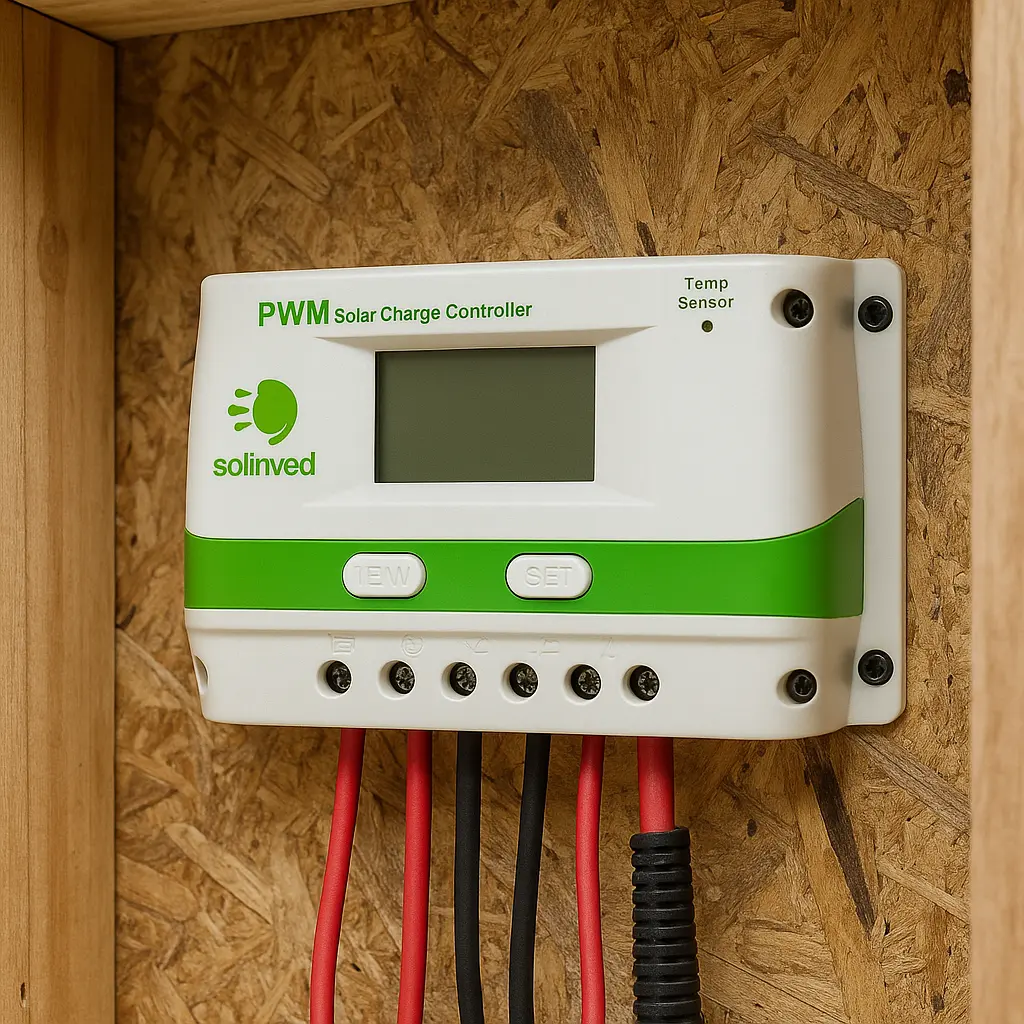


For solar energy systems to function effectively, the energy generated by solar panels must be stored and managed correctly. Charge controllers play a crucial role in this process. In solar energy systems, charge controllers prevent batteries from overcharging, increasing the long-term efficiency of the system. In this article, we will discuss what charge controllers do, how they work, and their importance in solar energy systems.
A charge controller is a device used in solar energy systems to manage the charging process of batteries. It regulates the voltage and current coming from solar panels to ensure the batteries are charged safely. Solar panels produce direct current (DC) electricity, but for it to be stored in batteries, the charging process must be controlled. Without a charge controller, batteries could be overcharged or undercharged, which would affect their lifespan and performance. Charge controllers are designed to protect the batteries and optimize the overall performance of the solar energy system.
Charge controllers monitor the energy from the solar panels and ensure that the batteries are charged within safe voltage limits. Here’s how they work:
Energy from Solar Panels: Solar panels convert sunlight into DC electricity. This electricity is directed to the charge controller, which regulates how much energy is sent to the batteries.
Voltage and Current Regulation: The charge controller constantly monitors the battery’s voltage and adjusts the energy flow accordingly. When the battery is close to full charge, the charge controller stops the flow of energy to prevent overcharging.
Overcharging and Deep Discharge Protection: Charge controllers prevent batteries from being overcharged, and they also protect them from deep discharge (where the battery is drained completely), which could damage the battery. This protection ensures longer battery life and better overall system performance.
Energy Routing: In some systems, charge controllers can also direct excess energy either back into the grid or directly to the appliances, enhancing energy efficiency.
There are several types of charge controllers available, each offering different features. The two primary types are PWM (Pulse Width Modulation) and MPPT (Maximum Power Point Tracking).
1. PWM (Pulse Width Modulation) Charge Controllers
PWM charge controllers are an older, more traditional technology and are often less expensive compared to MPPT controllers. PWM controllers regulate the charge by adjusting the width of pulses sent to the batteries. They are effective for smaller systems but are generally less efficient than MPPT controllers, especially in systems with larger solar panel setups.
Advantages:
Lower cost solution.
Simple and reliable technology.
Can be sufficient for small to medium-sized solar systems.
Disadvantages:
Lower efficiency, especially in conditions where solar panel output varies.
May not be ideal for larger or more complex systems.
2. MPPT (Maximum Power Point Tracking) Charge Controllers
MPPT charge controllers are more advanced and significantly more efficient than PWM controllers. MPPT technology tracks the maximum power point of the solar panels, which is the most efficient point where the panels generate the most energy. By continuously adjusting the input from the panels, MPPT controllers ensure that energy loss is minimized, and energy is maximized, even under less-than-ideal conditions.
Advantages:
Higher efficiency, often delivering up to 30% more energy from the same solar panels.
Can handle varying sunlight conditions effectively.
Allows for faster charging and reduces energy loss.
Disadvantages:
More expensive compared to PWM controllers.
More complex, which may require more maintenance.
3. Hybrid Charge Controllers
Hybrid charge controllers are designed to integrate solar power with the electrical grid. These controllers manage the energy flow between solar energy and the grid, enabling energy to be stored in batteries while also routing excess power back to the grid. Hybrid controllers are particularly useful in grid-tied systems.
Advantages:
Flexibility to use both solar power and grid electricity.
Provides a comprehensive energy management solution.
Excess energy can be sold back to the grid.
Disadvantages:
More expensive due to advanced technology and features.
May require complex installation and maintenance.
Charge controllers provide various benefits that are critical to the smooth functioning of solar energy systems:
Battery Lifespan Extension: By preventing overcharging and deep discharge, charge controllers ensure that batteries last longer, providing better value and performance over time.
Energy Efficiency: Especially with MPPT technology, charge controllers maximize the energy efficiency of solar systems by adjusting for changing sunlight conditions, ensuring the system produces as much energy as possible.
System Health Protection: By properly managing the energy flow, charge controllers help protect the entire solar system, including the batteries, solar panels, and other components.
Safety: Charge controllers prevent dangerous conditions such as overvoltage, overheating, and short circuits, helping to keep the system safe and functional.
Charge controllers are vital components of any solar energy system. They ensure that batteries are charged properly, protect against overcharging and deep discharge, and ultimately improve the overall efficiency of the system. PWM and MPPT charge controllers each offer unique benefits, with MPPT controllers providing higher efficiency and better performance in larger or more complex systems. Whether you are setting up a small off-grid system or a larger, grid-connected solar power solution, choosing the right charge controller will ensure your system works efficiently and lasts longer.
Investing in the right charge controller is key to maximizing your solar energy savings and ensuring the long-term performance of your solar system.